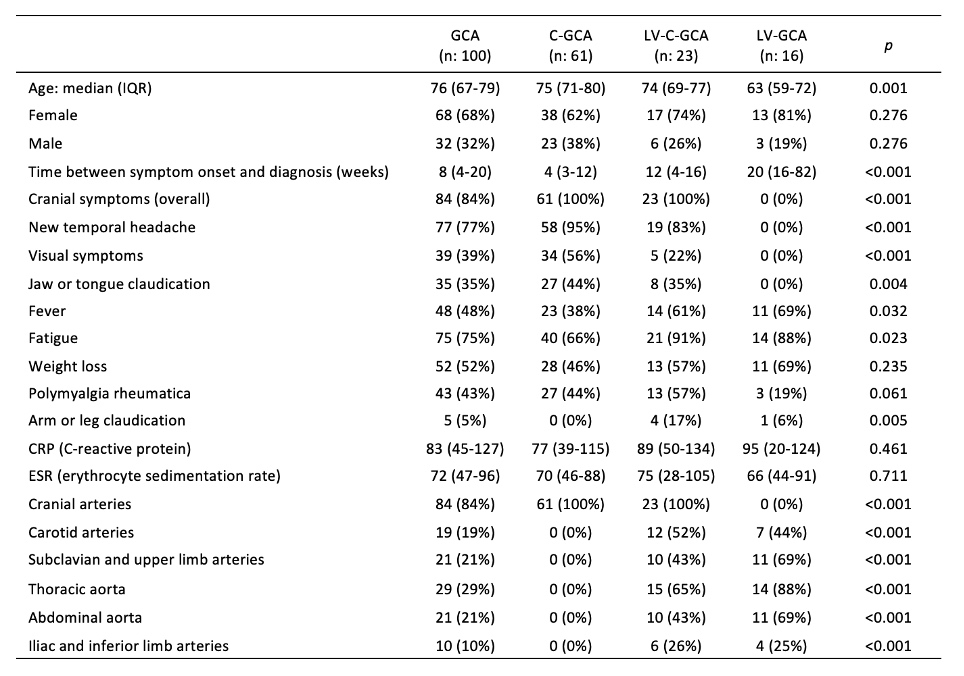Session Information
Date: Monday, November 8, 2021
Session Type: Poster Session C
Session Time: 8:30AM-10:30AM
Background/Purpose: Giant Cell Arteritis (GCA) is the most frequent systemic vasculitis in patients older than 50 years involving medium-sized and large arteries. Inflammation of the extracranial branches of the carotid artery gives rise to the classic symptoms of GCA. However, GCA involves also the aorta and its major branches in almost two-thirds of patients (1,2). Large vessel involvement leads to a different atypical clinical picture which can be challenging to diagnose (3). More information on clinical presentation and vessel involvement in large-vessel GCA are needed to better diagnose it. The aim of this study is to analyze a large cohort of GCA comparing patients with large-vessel involvement to patients with classical cranial disease.
Methods: 100 consecutive patients with a clinical diagnosis of GCA were enrolled in this retrospective study. All patients were older than 50 years of age, met the ACR criteria for GCA (4) or had a positive temporal artery biopsy or evidence of large vessel vasculitis at FDG-PET/CT scan.
Results: Based on vascular involvement, patients were classified into three group: 61 patients with only cranial arteritis (C-GCA), 16 patients with only extracranial large vessel vasculitis (LV-GCA) and 23 patients with both cranial and large vessel involvement (LV-C-GCA).
Compared to C-GCA, patients with large vessel involvement (LV-GCA and LV-C-GCA) were younger and more frequently women, and the difference was further significant for patients with isolated LV-GCA. Patients with isolated LV-GCA had also the longer duration of symptoms at GCA diagnosis [LV-GCA 20(16-82) vs LV-C-GCA 12(4-16) vs C-GCA 4(3-12) weeks; p< 0.001]. Systemic symptoms, as fever and fatigue, were associated with large vessel involvement, both in LV-GCA and LV-C-GCA groups. Polymyalgia rheumatica was equally reported in all three groups and no significant differences were found in inflammatory markers levels according to vessel involvement. In patients with large vessels involvement (LV-GCA and LV-C-GCA) thoracic aorta, subclavian arteries and abdominal aorta were the most frequently involved arteries.
Conclusion: GCA is not a single entity but includes several patterns of disease. Female gender, younger age and systemic symptoms are associated with large vessel involvement, regardless the presence or absence of cranial symptoms. The different clinical manifestations of large vessel GCA lead to a longer time to diagnosis if compared to C-GCA. For these reasons, in patients with the aforementioned characteristics, a large vessel involvement should be considered in order to reduce the time to diagnosis.
1: De Boysson H, et al. Clin Exp Rheumatol 2019; 2: Prieto-González S, et al. Ann Rheum Dis 2012; 3: Muratore F, et al. Rheumatol 2015; 4: Hunder GG, et al. Arthritis Rheum 1990
To cite this abstract in AMA style:
Regola F, Bosio G, Andreoli L, Franceschini F, Toniati P. Clinical Features at Disease Onset of Different Subsets of Large-vessel-giant Cell Arteritis in a Monocentric Cohort of 100 Patients [abstract]. Arthritis Rheumatol. 2021; 73 (suppl 9). https://acrabstracts.org/abstract/clinical-features-at-disease-onset-of-different-subsets-of-large-vessel-giant-cell-arteritis-in-a-monocentric-cohort-of-100-patients/. Accessed .« Back to ACR Convergence 2021
ACR Meeting Abstracts - https://acrabstracts.org/abstract/clinical-features-at-disease-onset-of-different-subsets-of-large-vessel-giant-cell-arteritis-in-a-monocentric-cohort-of-100-patients/

